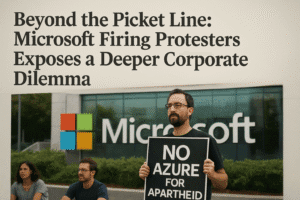Beyond the Picket Line: Microsoft Firing Protesters Exposes a Deeper Corporate Dilemma
Microsoft has terminated four employees for organizing on-site protests against the company’s business ties with Israel. The dismissals, which followed a sit-in at the office of President Brad Smith, were due to what the company called serious breaches of safety and conduct policies. The protests were fueled by allegations that Microsoft’s Azure cloud platform supports Israeli surveillance efforts in Gaza. This action reflects a broader pattern of internal dissent at the company, which has previously fired workers for similar demonstrations.
The conflict underscores the growing pressure on tech corporations to navigate ethical concerns over their government contracts. It also highlights the deepening divide between corporate policy and employee activism in politically charged environments. Ultimately, the situation illustrates the complex challenges companies face when global operations collide with workforce demands for moral accountability.

Beyond the Picket Line: Microsoft Firing Protesters Exposes a Deeper Corporate Dilemma
In a move that reverberates beyond the tech industry, Microsoft has terminated four employees for participating in on-site protests against the company’s business ties with Israel. The firings, which occurred after a sit-in at the office of President Brad Smith, highlight the intensifying pressure on corporations to navigate deeply polarizing global conflicts and the limits of internal dissent.
The action marks a significant escalation in the ongoing tension between the tech giant and a segment of its workforce, forcing a conversation about where corporate policy ends and employee activism begins.
The Catalyst: From Protest to Termination
The immediate events leading to the firings were dramatic. Earlier this week, a group of seven individuals, including current and former Microsoft employees, occupied the office of President Brad Smith in a peaceful sit-in. Organized by the group “No Azure for Apartheid,” the protest was a direct challenge to Microsoft’s provision of cloud services, specifically its Azure platform, to Israeli entities.
The group’s core demand is for Microsoft to sever all contracts with Israel and pay reparations to Palestinians, citing Israel’s military assault on Gaza. Following the sit-in, two employees, Anna Hattle and Riki Fameli, were fired via voicemail. Two more, Nisreen Jaradat and Julius Shan, who had participated in related encampments at the Microsoft campus, were dismissed on Thursday.
Microsoft’s official stance is that the terminations were not about the protest’s message, but its method. The company stated the actions constituted “serious breaches of company policies” and “created significant safety concerns.” This echoes President Smith’s previous comments about respecting lawful “freedom of expression.”
The Heart of the Conflict: Technology and Accountability
The protesters’ concerns are rooted in a specific and serious allegation. A recent joint investigation by The Guardian, +972 Magazine, and Local Call reported that an Israeli military surveillance agency is using Microsoft’s Azure cloud to store and process a massive trove of recorded Palestinian mobile phone calls.
For the employees, this isn’t a abstract ethical debate; it’s about their work potentially enabling what they, and many international bodies, have labeled a humanitarian catastrophe. “We are here because Microsoft continues to provide Israel with the tools it needs to commit genocide while gaslighting and misdirecting its own workers about this reality,” stated fired employee Anna Hattle.
This puts Microsoft in a bind familiar to many major tech firms: how to balance lucrative government contracts with the ethical concerns of their workforce and the public. In response to the surveillance allegations, Microsoft has hired law firm Covington & Burling LLP to conduct an independent review—a step that acknowledges the gravity of the claims but falls short of the immediate action protesters demand.
A Recurring Pattern, Not an Isolated Incident
This is not the first time Microsoft has faced internal upheaval over this issue. The firings follow a pattern:
- In April, Microsoft’s 50th-anniversary celebration was disrupted when an employee interrupted AI CEO Mustafa Suleyman’s speech. That employee and another were also subsequently fired for protesting the company’s Israel ties.
This pattern suggests a hardening of Microsoft’s approach to on-site activism, establishing a clear red line that while employees may protest, occupying executive offices or disrupting major events violates policy and will result in termination.
The Bigger Picture: Corporations as Political Battlefields
The situation at Microsoft is a microcosm of a much larger global phenomenon. From campus protests to consumer boycotts, institutions with ties to Israel are facing unprecedented scrutiny due to the soaring human cost of the war in Gaza.
For the modern workforce, particularly in tech, the idea of a job being purely a job is fading. Employees increasingly expect their employers’ values to align with their own, and they are willing to leverage their position to push for change, even at great personal risk. Companies, in turn, are struggling to manage their public image, shareholder interests, government relationships, and internal morale all at once.
The Human Insight: This story is more than a HR dispute. It’s about the evolving social contract between corporations and their employees. It asks a difficult question: In an era where technology is inextricably linked to global politics, can a company truly be neutral? And if not, who within the company gets to decide where it stands?
The fired Microsoft workers have made their choice, betting their careers on the principle of accountability. Microsoft has made its choice, upholding its policies and business decisions. The outcome of this clash will likely influence how tech giants and their workforces navigate the fraught geopolitical landscape for years to come.
You must be logged in to post a comment.